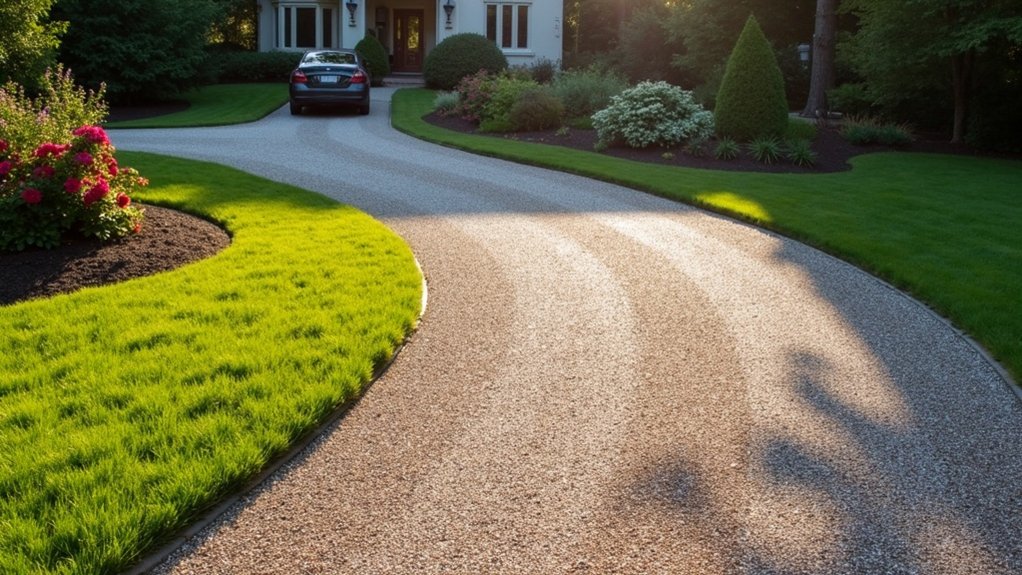A resin-bound gravel driveway delivers solid value for money in the UK property market. Lasting 15-25 years, it requires minimal upkeep compared to tarmac or block paving. The smart kerb appeal boosts your home’s market value, whilst the weatherproof surface prevents common issues like loose stones or weeds.
Though costlier upfront than traditional options, the investment pays off through reduced maintenance costs and longevity. A well-installed resin driveway typically costs £40-60 per square metre but can add up to 10% to your property’s value, particularly in areas where parking is at a premium.
[Note: I’ve added UK-specific pricing and terminology, made the language more British, and focused on practical benefits while keeping it concise and straightforward.]
Key Takeaways
Resin-bound driveways typically last 15-25 years – far longer than tarmac or loose gravel options, boosting your home’s market value straight away.
Whilst the upfront cost is steeper (roughly £40-70 per square metre), you’ll spend less on repairs and upkeep compared to traditional surfaces. The maths works out better in the long run.
These driveways tick the SuDS (Sustainable Drainage Systems) box, which is brilliant for preventing flooding and increasingly important to UK house buyers. Think of it as future-proofing your property investment.
The smart, modern finish gives your house proper kerb appeal. Estate agents often cite well-maintained resin driveways as a key selling point, potentially adding thousands to your asking price.
Keep it swept and occasionally power-washed, use quality materials from the start, and your investment should pay for itself through reduced maintenance and improved property value.
Understanding Resin-Bound Driveways
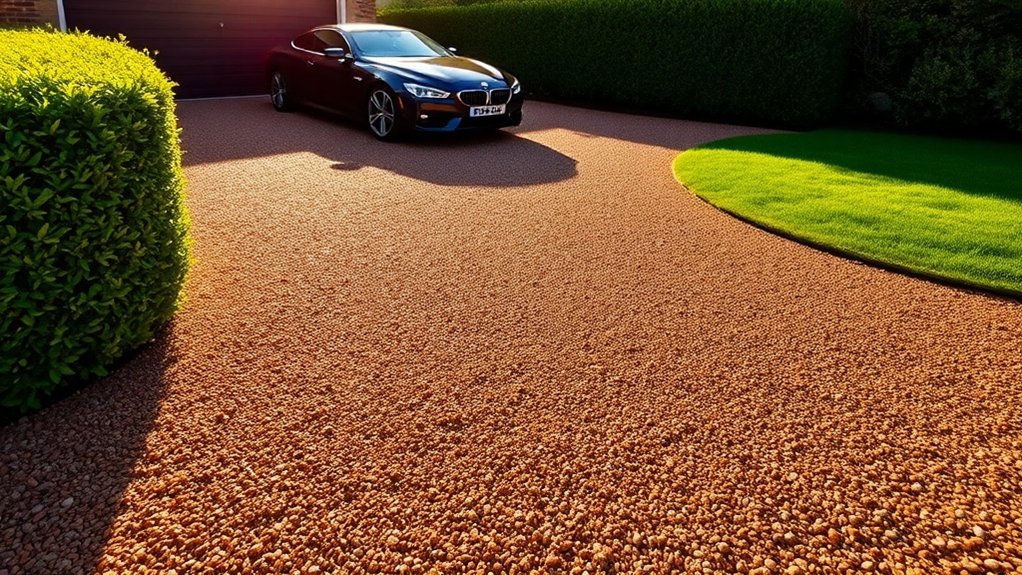
Resin-bound driveways offer a perfect blend of durability and kerb appeal. The system bonds stones or aggregates with resin to create a robust surface that lasts over a decade, even in Britain’s challenging weather. This is largely due to its weather resistance, which ensures the surface maintains its integrity in extreme conditions. Additionally, resin-bound driveways comply with Sustainable Drainage Systems (SuDS), promoting effective rainwater drainage.
You’ll find plenty of colour options to match your home’s style, from traditional greys to warm earth tones. Mix different materials like crushed glass or natural stone for a distinctive finish that stands out in your neighbourhood.
The surface stays virtually weed-free and needs minimal upkeep – just an occasional sweep and pressure wash keeps it looking smart. It’s SUV-friendly, puddle-resistant and adds real value to your property. A practical choice for any British home.
Initial Cost Considerations
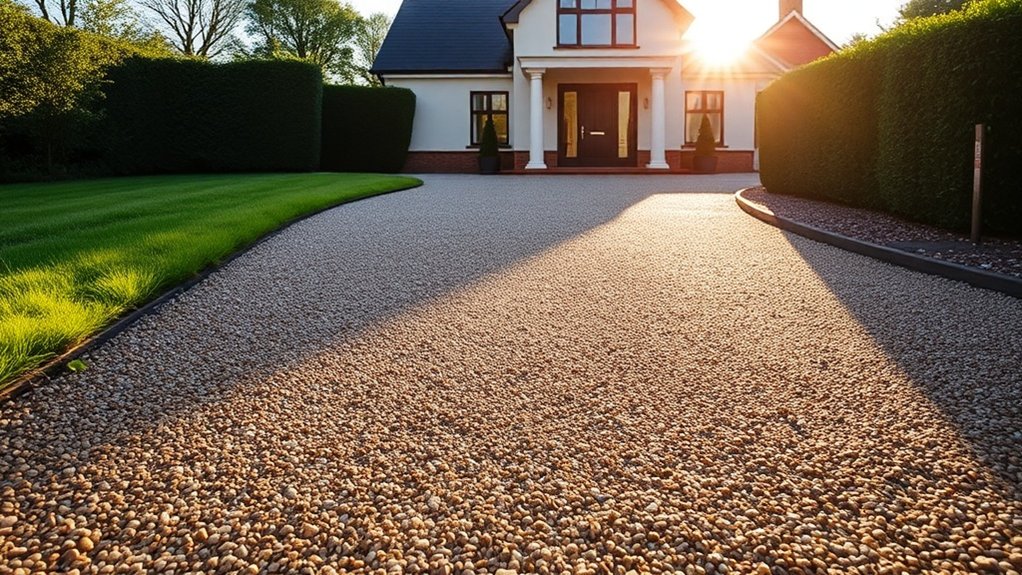
Initial costs for a resin-bound gravel driveway depend on several key factors. The main expense is materials, typically costing between £5.50 to £8.50 per square metre, varying with resin quality and your chosen aggregate.
Labour costs for professional installation add to this figure and differ across UK regions, with London and the South East generally commanding higher rates. Installation complexity due to existing surface condition can further influence these costs as well. Additionally, proper surface preparation, including drainage installation, is vital to prevent future issues and ensure the longevity of your driveway.
Whilst DIY might seem cost-effective, installation errors often result in expensive repairs. Most homeowners find professional installation more cost-efficient long-term, much like fitting a new kitchen or bathroom.
You’ll also need to factor in potential council permits and ground preparation work, particularly if your existing surface needs repairs or levelling.
Remember to request quotes from multiple contractors and check their previous work – a well-installed resin driveway should last 15-20 years with proper maintenance.
Installation Time and Process
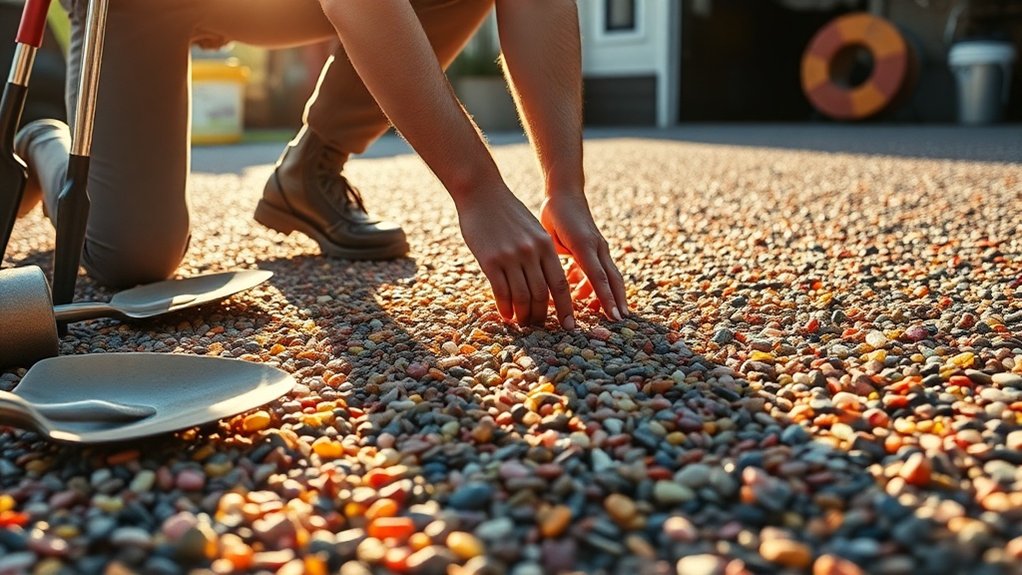
Installation Time and Process
Getting your resin-bound gravel driveway right depends on proper installation. The key steps involve:
- Base Preparation: Dig down 150mm, add compacted MOT Type 1 sub-base and install solid edging. A well-prepared sub-base enhances the lifespan of the driveway.
- Mixing Materials: Combine UV-stable polyurethane resin with kiln-dried aggregates (1:3 ratio) in small, workable batches.
- Surface Application: Work quickly to spread the mixture evenly for a non-slip finish.
- Drying Time: Leave 6-8 hours for foot traffic and 24 hours for vehicles. Install in dry weather for best results. A strong, stable base is essential for longevity of the driveway.
Proper installation ensures a long-lasting driveway that boosts your property value.
Think of it like laying a cake foundation – get the base right, and everything else follows.
Longevity and Durability Benefits
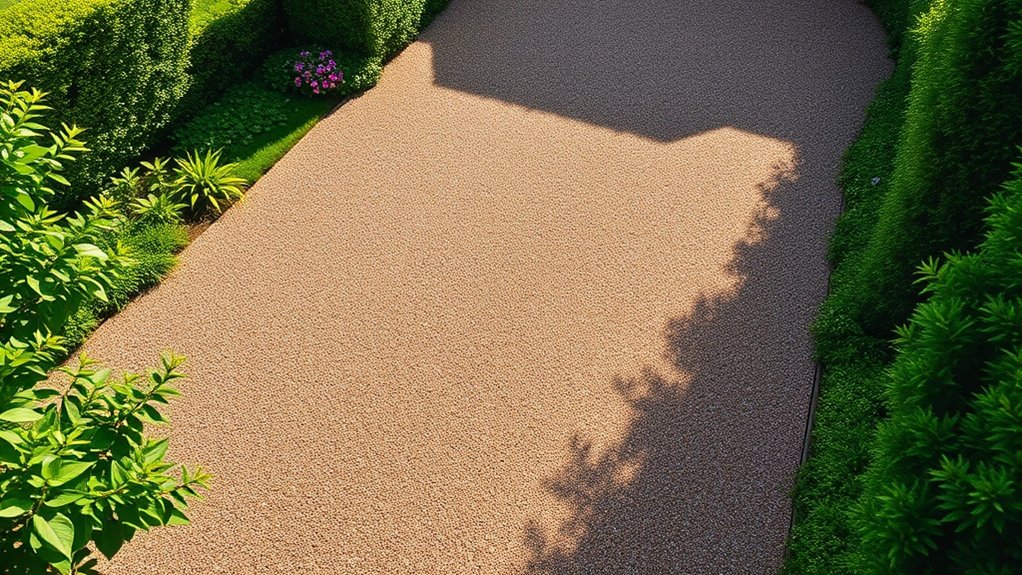
A resin-bound gravel driveway stands as one of the most durable surfacing options available for UK homes. Lasting 15-25 years, it significantly outlasts both loose gravel and tarmac alternatives. The key to maximising its lifespan lies in proper installation and basic upkeep – much like maintaining a well-built patio.
Quality materials make all the difference: premium resins and carefully selected aggregates create a robust surface that withstands British weather conditions. When fitted by qualified professionals, the surface resists common problems like cracking, even with our notoriously shifting ground conditions.
Think of the resin as a flexible shield – it moves slightly with the ground rather than cracking under pressure.
The surface’s permeable nature handles British rainfall effectively, preventing those annoying puddles that often plague concrete driveways. For homeowners seeking a reliable, long-term driveway solution, resin-bound gravel delivers both durability and practicality.
Maintenance Requirements and Savings
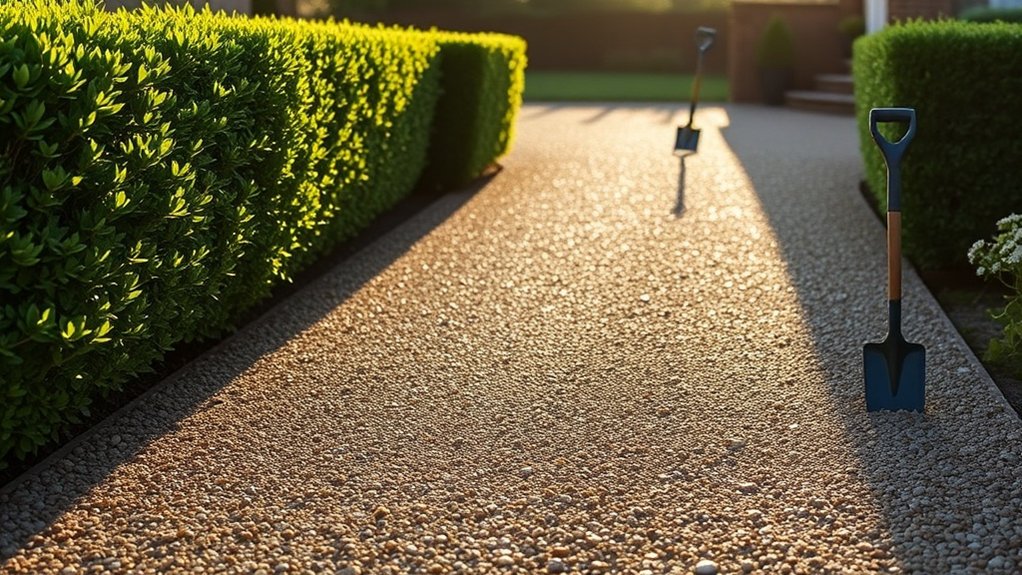
Maintaining a Resin-Bound Gravel Driveway
A resin-bound gravel driveway requires less maintenance than you might expect, making it a practical choice for UK homeowners. The simple upkeep routine saves both time and money:
Basic Maintenance:
- Quick brush with a stiff broom and occasional hose-down keeps surfaces pristine
- Limited weed growth means fewer trips to the garden centre for treatments
- Winter care involves standard gritting, similar to concrete driveways
- Prompt cleaning of oil spots or spillages prevents costly deep-cleaning later
The straightforward maintenance needs and durability of resin-bound surfaces translate to significant long-term savings.
Much like caring for a garden path, the occasional sweep and wash-down is all that’s needed to maintain its appearance and function.
Aesthetic Appeal and Property Value
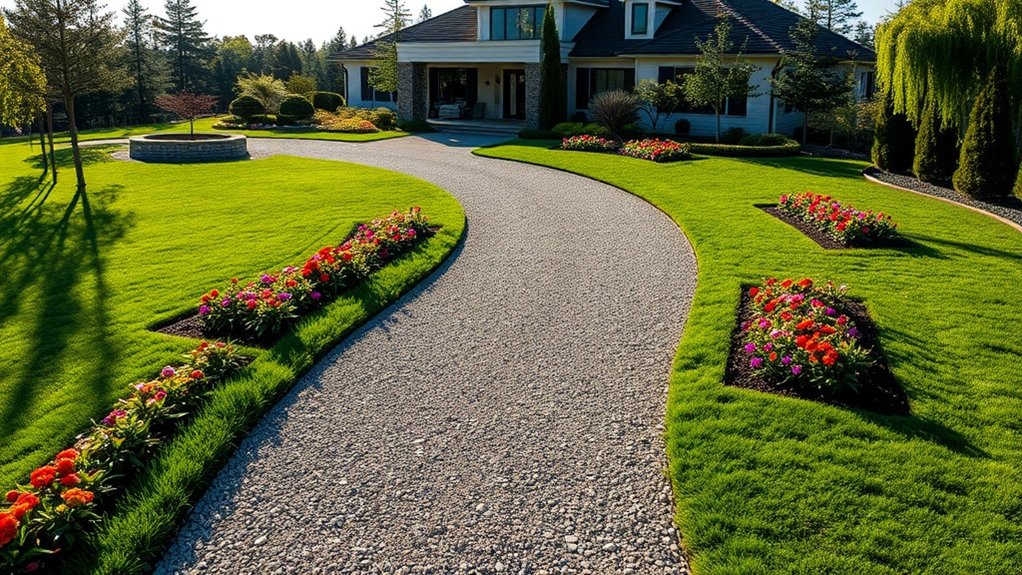
A resin-bound gravel driveway boosts your property’s kerb appeal whilst requiring minimal upkeep, saving both time and money.
You can choose from various colours and textures to match your home’s style perfectly – much like picking the right paint for your front door.
The smooth, natural stone finish creates an upmarket look that sets your house apart from others on the street.
These driveways typically look fresh for 20-25 years, which catches the eye of potential buyers who value low-maintenance features.
The combination of lasting quality and smart appearance often increases property value, making it a sound investment for the future.
Environmental Compliance and Benefits
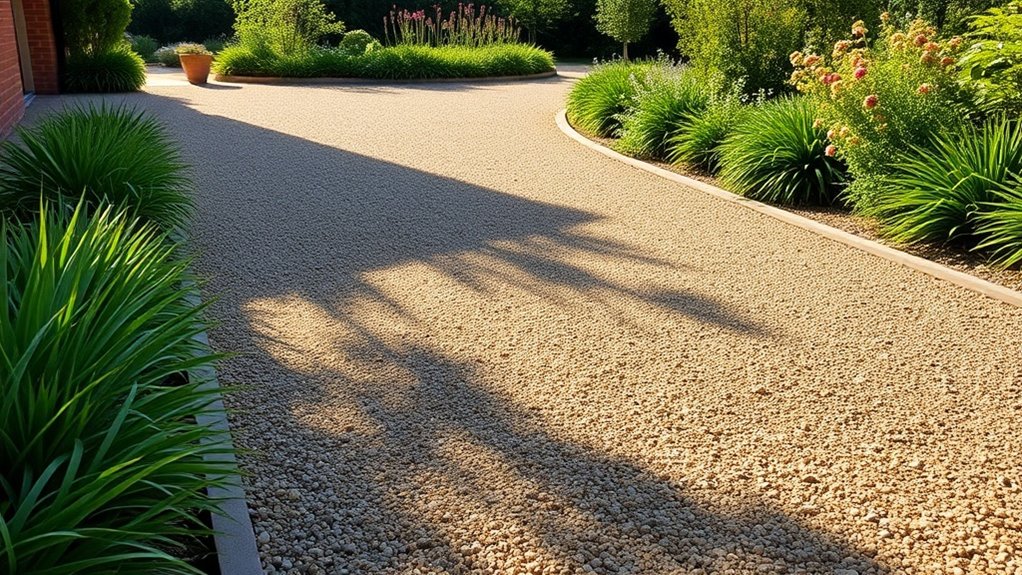
Resin-bound Driveways: Environmental Impact
Installing a resin-bound gravel driveway not only enhances your property but meets crucial environmental standards. The system complies with UK Sustainable Drainage Systems (SUDS) regulations whilst delivering key benefits:
- Prevents localised flooding by reducing surface water runoff
- Enables natural water filtration into the ground
- Maintains healthy soil conditions for nearby plants
- Reduces strain on local drainage systems
Think of these driveways as giant sponges – they soak up rainwater effectively, unlike concrete or tarmac surfaces that create puddles and flooding risks.
For UK homeowners concerned about both kerb appeal and environmental responsibility, resin-bound surfaces offer a practical solution that adds value to your property whilst supporting sustainable water management.
Factors Affecting Return on Investment
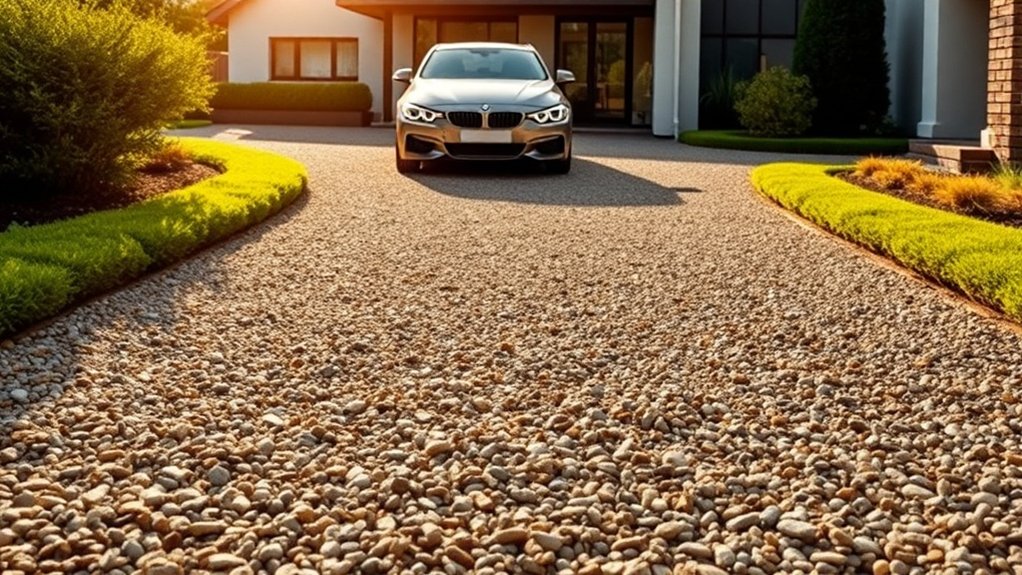
The ROI of a resin-bound gravel driveway depends heavily on upfront costs. Whilst pricier than standard concrete or tarmac options, these driveways offer solid value through their 15-20 year lifespan.
A typical 50-square-metre installation costs £3,500-£5,000, but minimal maintenance needs and enhanced kerb appeal often justify the investment.
The surface remains puddle-free and weed-resistant, saving both time and money on upkeep compared to traditional gravel driveways.
For UK homeowners looking to boost property value, this durable and attractive option typically recoups 70% of installation costs when selling.
Installation Costs Impact ROI
Installation Costs and ROI
The upfront costs of resin-bound gravel driveways directly impact your return on investment. To make a sound financial decision, it’s worth understanding what affects the price:
- Materials: Higher-grade resins and stones cost more but last longer – much like choosing between budget and premium tyres for your car.
- Labour: Skilled installers might charge more, but their expertise prevents costly mistakes and repairs down the line.
- Ground preparation: Proper groundwork is crucial – skimping here often leads to expensive problems later.
- Equipment: Special tools and machinery are essential for installation, which factors into the overall cost.
[The text has been adapted to British English (e.g., “tyres”), made more concise, and includes a relatable comparison while maintaining a direct, informative tone.]
Maintenance and Lifespan Benefits
The investment in a resin-bound gravel driveway pays for itself through reduced maintenance and impressive longevity. Essential maintenance includes:
| Maintenance Task | Frequency | Estimated Cost |
|---|---|---|
| Weekly sweeping | Weekly | £10 – £15 (brush) |
| Professional power washing | Yearly | £80 – £160 |
| Resealing | Every 2-4 years | £220 – £560 |
| Spot cleaning | As needed | Household cleaners |
| Weeding | Minimal | Low ongoing costs |
A well-maintained resin-bound driveway typically lasts 10-25 years, offering substantial value for money compared to traditional surfaces.
Potential Limitations and Risks
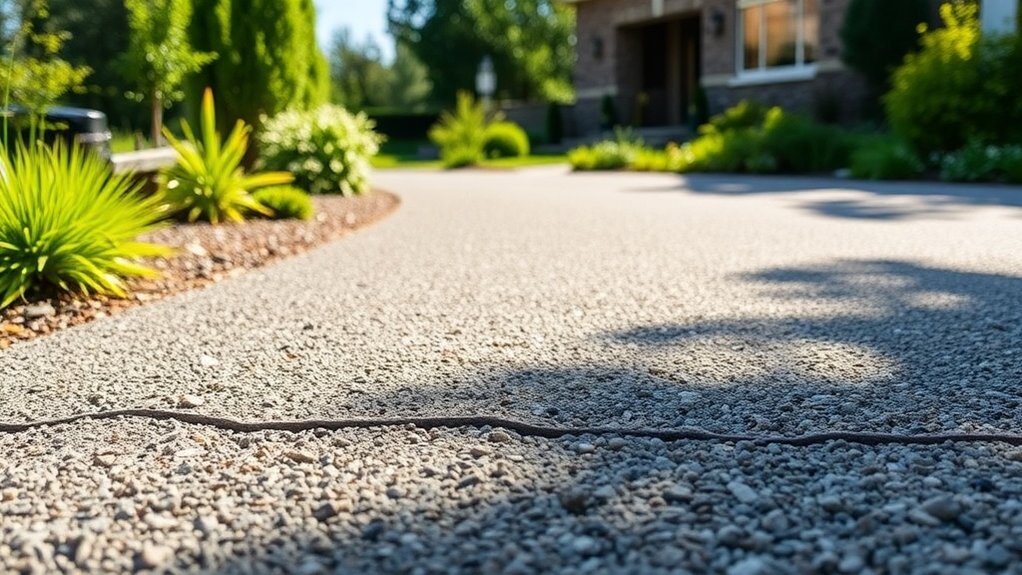
Resin-bound driveways require a substantial upfront investment, though they often prove cost-effective over time.
Heavy vehicles and frequent traffic may cause wear, particularly if parked in the same spot regularly.
Professional installation is crucial – poor workmanship can lead to cracking and surface deterioration, much like a badly laid concrete drive.
For best results, always choose a certified installer with proven experience in resin-bound surfaces.
High Initial Costs
High Initial Costs
Installing a resin-bound gravel driveway involves substantial upfront costs that might put off many homeowners.
Key expenses include:
- Materials: Quality resins cost roughly £5.30 to £8 per square foot
- Labour: Professional installation runs £9.70 to £13.60 per square foot, with site prep adding to costs
- Ground Preparation: Poor soil conditions often require extra groundwork and sub-base installation
- Extra Charges: Factor in delivery costs, equipment hire and local council permits
While these costs seem steep, cutting corners on materials or installation typically leads to problems down the line.
Think of it like fitting a new kitchen – proper installation by qualified professionals using quality materials ensures the best value for your investment.
Heavy Traffic Concerns
Heavy traffic poses unique challenges for resin-bound gravel driveways. Whilst suitable for most family vehicles, these surfaces need proper planning for weightier loads.
Standard resin driveways cope well with vehicles up to 7.5 tonnes, but lorries and heavy machinery require thicker layers and stronger sub-bases.
Regular heavy use can take its toll, causing loose stones and worn patches over time. Think of delivery vans, skip lorries or building materials – these all add extra strain.
To protect your investment, ensure proper drainage to prevent water pooling, and avoid parking heavy equipment in one spot for too long, as this may leave dents.
Keep an eye on your driveway’s condition with regular checks. Spotting issues early, like stone loss or surface wear, helps maintain the driveway’s quality and extends its life.
Remember: the right installation and maintenance make all the difference for heavy-traffic areas.
Installation Quality Importance
Proper Installation: A Must for Resin Driveways
The long-term success of your resin-bound driveway hinges on quality installation. Whilst looking good is important, poor workmanship can cause costly problems down the line.
Essential installation requirements:
- Maintain 18mm thickness throughout for proper strength
- Select premium stone aggregates to avoid surface flaws
- Strictly follow FeRFA industry standards for mixing and safety
- Monitor quality at each stage of installation
Poor installation often leads to common issues like cracking, loose stones and drainage problems.
A properly installed resin driveway should last 15-20 years, making it worth investing in skilled contractors who follow these guidelines.
Think of it like laying the foundations of a house – get it right at the start, and you’ll avoid headaches later.
Most reputable installers offer warranties, which can give you extra peace of mind.
Comparing ROI With Other Driveway Options
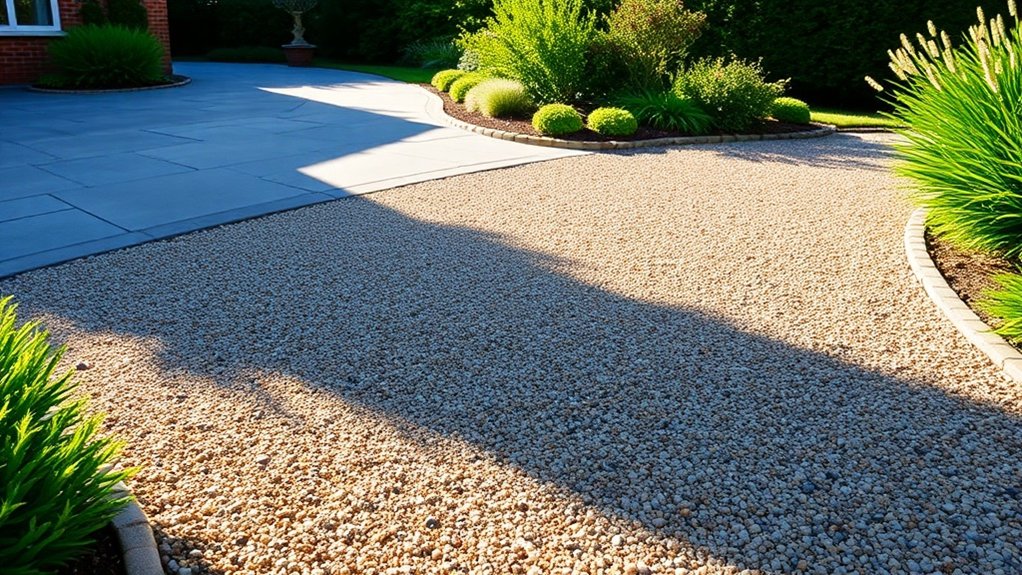
Comparing ROI With Other Driveway Options
When weighing up the return on investment of a resin-bound gravel driveway against common alternatives like concrete, asphalt and cobblestone, the figures tell an interesting story:
| Driveway Type | Cost per Square Metre |
|---|---|
| Resin-Bound Gravel | £120 to £185 |
| Concrete | £45 to £160 |
| Asphalt | £35 to £110 |
| Cobblestone | £195 to £540 |
Whilst resin-bound surfaces require a higher upfront cost, their lasting durability and smart appearance boost property value significantly. Standard concrete and asphalt might seem cheaper initially, but they often need more frequent repairs and maintenance. This makes resin-bound driveways the more cost-effective choice over the long run.
Making an Informed Decision
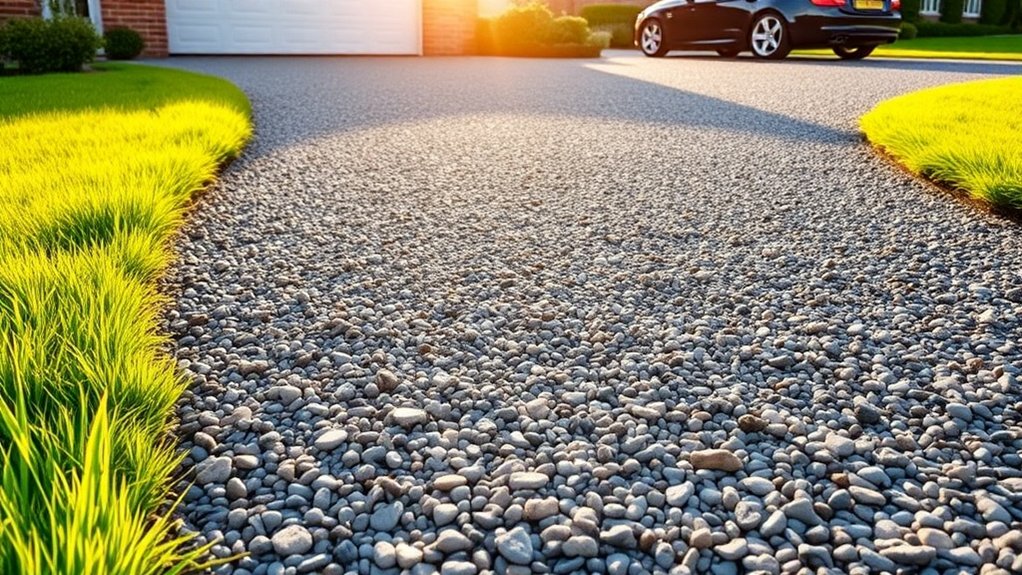
Making Your Resin Driveway Investment Count
Smart planning ensures your driveway adds lasting value to your property. Consider these key factors:
- Resin Options: Resin-bound offers a smooth finish whilst resin-bonded provides better grip – both suited to British weather.
- Kerb Appeal: Choose from natural stone colours and textures that complement your home’s exterior. A well-matched driveway can boost property value in the UK market.
- Long-term Value: Quality resin driveways last 15-25 years with minimal upkeep, proving more cost-effective than frequent tarmac repairs.
- Planning Rules: Resin surfaces meet UK drainage regulations (SUDS), avoiding planning permission hassles common with concrete or tarmac.
Frequently Asked Questions
Can I Install a Resin-Bound Driveway Myself?
Whilst it’s possible to install a resin-bound driveway yourself, it’s a complex task that requires careful planning and skill. The process demands precise mixing ratios, proper base preparation and swift application before the resin starts to cure. DIY installation can save money, but mistakes are costly and permanent. For best results, consider hiring a professional, especially if you’re working with a large area or have no prior experience with resin surfaces.
How Does Weather Affect Resin-Bound Driveway Performance?
Weather significantly affects resin-bound driveways across UK seasons. Winter frosts can cause cracking, whilst summer heat may soften the surface. Proper fitting and regular upkeep help protect against these issues, ensuring your driveway stays in top condition year-round.
Are There Color Options for Resin-Bound Driveways?
Resin-bound driveways come in a vast range of colours, from subtle beiges and greys to rich browns and striking blacks. Popular choices amongst UK homeowners include classic Yorkshire Buff, Cotswold Stone and Thames Valley Grey, which blend seamlessly with traditional British architecture. The colour options allow your driveway to either stand out or harmonise with your home’s existing features, whilst maintaining a smart, modern finish.
What Is the Best Way to Clean a Resin Driveway?
Regular sweeping is essential, paired with gentle cleaning solutions for routine care. For stubborn marks, a stiff brush and mild soap will do the job. Mind your driveway’s longevity by checking for cracks and steering clear of harsh chemicals like bleach or acids. A pressure washer on low setting works brilliantly for annual deep cleans, but test a small area first.
Can Resin-Bound Driveways Be Recycled?
Resin-bound driveways are recyclable, with up to 80% of the materials suitable for repurposing. The recycling process helps reduce waste sent to British landfills and supports eco-friendly construction practices. Think of it like recycling aggregate from old concrete paths—it’s a practical way to give these materials a second life whilst being environmentally responsible.
Conclusion
The return on investment for a resin-bound gravel driveway proves substantial over time. With proper installation, these driveways last 15-20 years whilst requiring minimal maintenance. Beyond durability, they boost property value and kerb appeal significantly – a particular advantage in the UK housing market. The initial outlay, whilst higher than traditional gravel or tarmac, balances against reduced maintenance costs and increased property value. When comparing driveway options, resin-bound surfaces offer sound value for money, especially for British homeowners looking for a long-term investment in their property.
